Bankruptcy trustee says McQuillen project could look for new developer by end of February
By Bob Steenson, bsteenson@charlescitypress.com
A trustee from U.S. Bankruptcy Court walked through the unfinished McQuillen Place building in Charles City Monday morning after a meeting with creditors, and said information for potential new project developers could be available by the end of February.
A hearing was held first at the bankruptcy courtroom in Mason City on Monday morning with representatives of McQuillen Place Co. LLC, the Iowa Economic Development Authority, First Security Bank & Trust and others to discuss how the McQuillen Place property could be made available for sale to be purchased and completed.
Also at that hearing, questions were raised about why the project had not been finished.
Charles Thomson of Charles City, the majority equity holder and managing member of McQuillen Place Co., gave bankruptcy Trustee Charles Smith a brief history of the tangled legal status of the project that is still to be resolved, in addition to the bankruptcy proceedings.
McQuillen Place Co. is owned 60% by Thomson and 40% by James Gray, the owner and managing director of Cornice & Rose International, an architecture and construction firm located near Chicago that did the design work and oversaw much of the construction for the project.
First Security Bank & Trust had filed in March 2018 in Floyd County District Court to foreclose on a construction mortgage to McQuillen Place Co. that the bank said was in default for lack of payment.
Thomson filed for Chapter 11 bankruptcy on behalf of McQuillen Place Co. in April 2019, to reorganize and continue the project, but in December the bankruptcy judge converted the bankruptcy to Chapter 7.
Under Chapter 7, a trustee — Smith — is assigned to liquidate the assets of the business, selling them off to raise as much money as possible to pay the people who claim the business owes them money.
Smith said Monday that he has been contacted by five developers who were interested in finishing the project.
Thomson said he was also interested in finishing the project himself, but his main concern is that it be completed by someone.
Several suits and countersuits have been filed in Floyd County District Court and U.S. Bankruptcy Court over the matter, including suits filed by various limited liability companies that Thomson controls and that are parties to the foreclosure, against the bank and against specific directors of the bank, claiming that they did not act in good faith in dealing with their client.
Both Thomson and Gray answered questions from Trustee Smith Monday morning, as well as from attorneys representing First Security Bank and the Iowa Economic Development Authority.
Thomson said the building is insured and heated, and he has a man who goes through it at least every other week, and more frequently when it is cold.
Smith said that for at least the next couple of months he would like that person to check on the property daily.
Attorney Frank Eide of Mason City, representing First Security Bank, asked several questions regarding estimated costs to finish the project.
Thomson said it depends on what you mean by “finish.”
“The bare minimum would be north of $450,000, and that’s finishing the apartments,” he said.
The original plan, Thomson said, was to complete some apartments first and rent those so that money could be used to continue work. The ground floor spaces for commercial use would be constructed by the tenants according to their particular needs.
There have been a number of estimates from different sources on finishing costs, some more detailed than others, he said.
“A big item in differentiating these estimates is how much of the first floor would be done,” Thomson said.
Eide asked why the project had taken so long and why it stalled.
Thomson said the project was delayed by various reasons such as unavailability of skilled workers, changes in requirements by MidAmerican Energy and the need to get a new vendor for electrical equipment because of the unwillingness of the original vendor to work with MidAmerican.
But the reason it isn’t finished is because the state didn’t come through with promised Enterprise Zone credits, that would have been worth about $500,000 to $560,000 to the project, he said.
Thomson said they found out that there was a two-year deadline on completing construction to qualify for the credits, but the credits had been approved in October 2013 and major construction didn’t begin until spring 2015.
“There was no way for the amount of money that was allocated that building could be finished within two years after the award letter,” Thomson said.
He said people who were advising him on the project said it wouldn’t be difficult to get an extension, and there were examples where extensions or waivers had been granted, including on other Charles City projects, but the Iowa Economic Development Authority said it was bound by the rules and refused to award the credits.
One of the lawsuits filed in Floyd County District Court is by McQuillen Place Co. against the IEDA. That lawsuit, like the foreclosure, was stayed by the bankruptcy proceedings.
Gray, of Cornice and Rose, said his company is still owed more than $2.5 million for work it has done.
First Security Bank has said it is owed more than $4 million in principle, interest and late charges on its construction loan.
There are about 20 creditors listed in the bankruptcy documents, ranging from the largest creditor, the bank, to many others who say they are owed several thousand dollars each.
After the hearing, the group, along with several Charles City officials and others, gathered at the McQuillen Place building for a walk-through.
Trustee Smith told the Press he wanted to get an idea of what shape the building was in and what they were working with to help him decide how it would be offered for sale to a new developer.
One of the items of contention between Thomson and the bank has been the condition of the building and whether it is deteriorating.
The bank has argued in court documents that a missing window pane above the courtyard exposes part of the building to the elements, that there are holes in the plywood that is covering openings on the ground floor “large enough to allow animals and varmints to enter the property,” and that McQuillen Place Co. has failed “to preserve and protect the property.”
On the walkthrough, Ann Schmid, with the Iowa Economic Development Authority, pointed out some areas of water damage, but Gray said they were mostly cosmetic and that the instances where water was entering the building had been fixed.
Thomson has stated in court documents that the building is “water-tight, regularly inspected and heated.”
“Regular inspection of the apartment section of the building (including a thorough inspection by a pest-management professional) have revealed zero activity by rodents, vermin, insects or similar creatures,” he wrote.
In the area in the courtyard with a missing window pane, Gray said that is a space that is open to the outside at the ends, and the materials in there are exterior materials.
When Schmid pointed out an area under the opening where the exterior covering was peeling away, Gray allowed that that area would need to be inspected for water damage.
After the walkthrough, representatives of the bank and the IEDA met to discuss “finalizing documents for proposals from interested developers,” Schmid told the Press.
Thomson was not allowed at that meeting because he intends to be a bidder on a new development package. The meeting was also closed to the public and press.
Asked if the state is interested in offering some sort of financial incentive package to help a new developer, Schmid said, “Yes. That’s all I can tell you.”

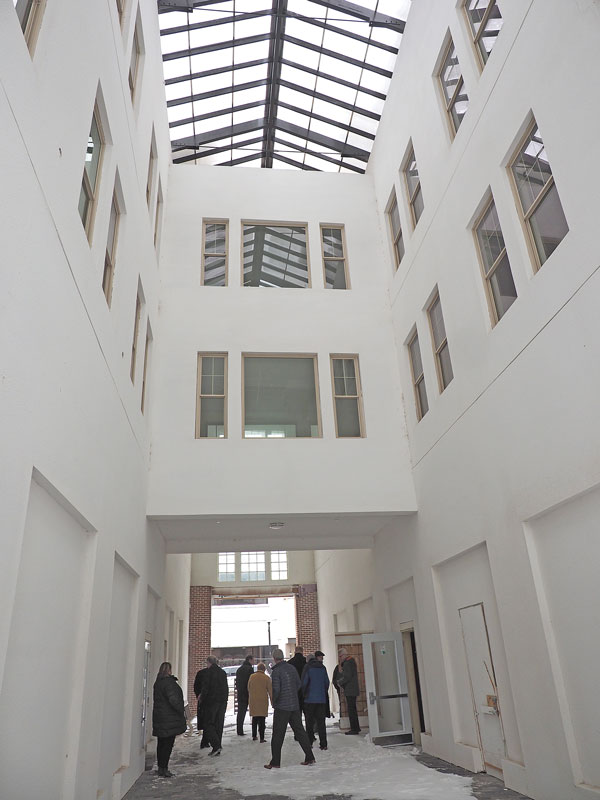
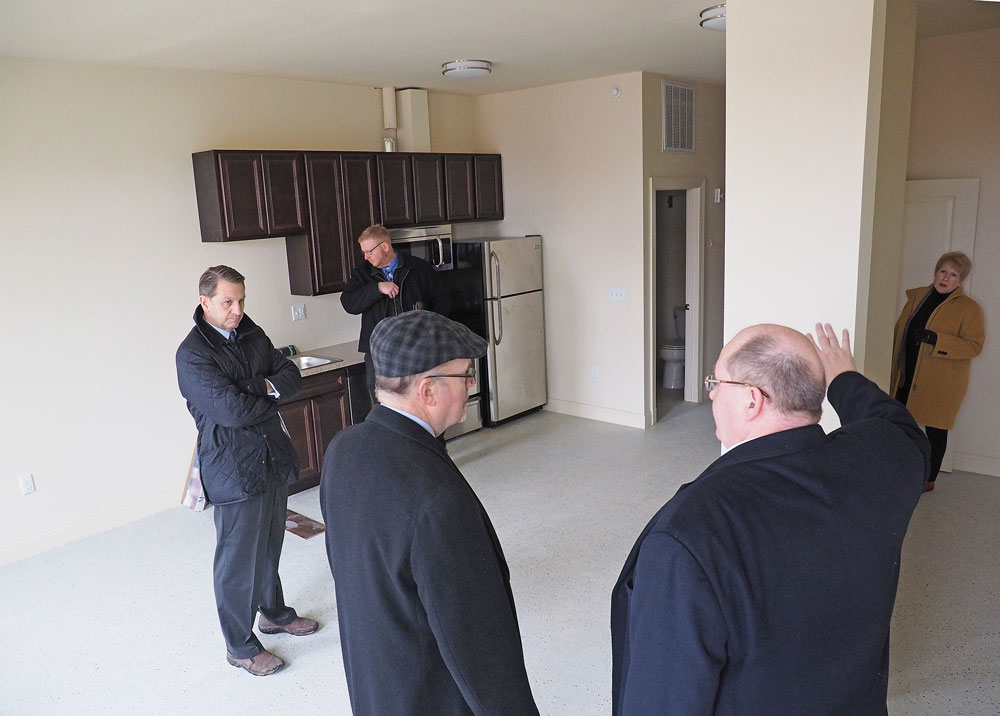
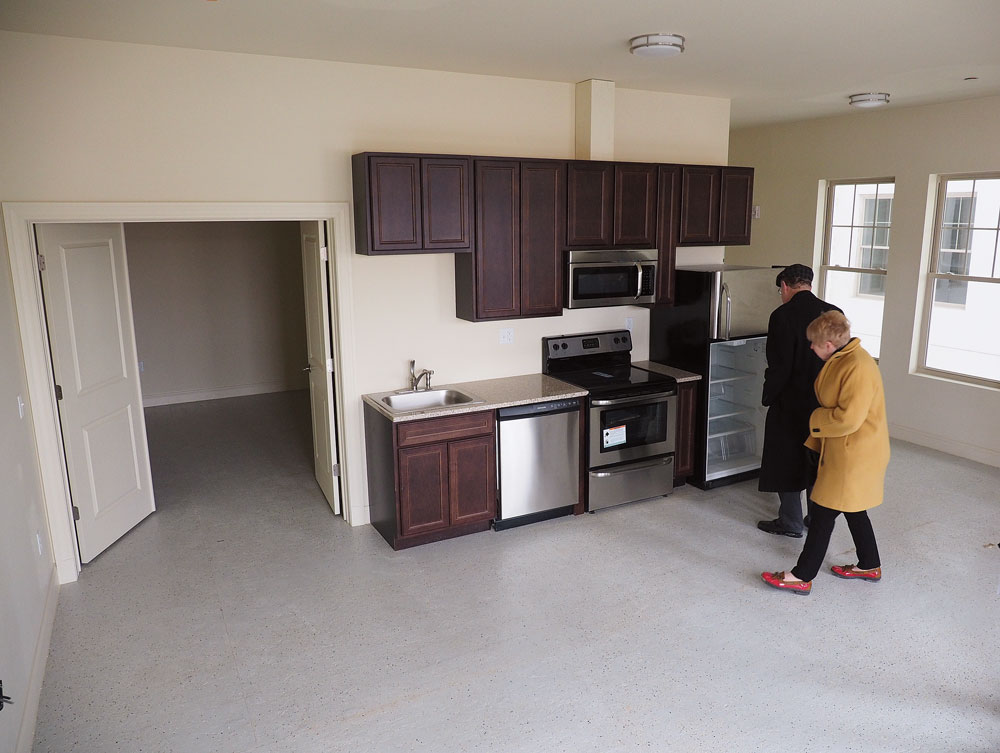
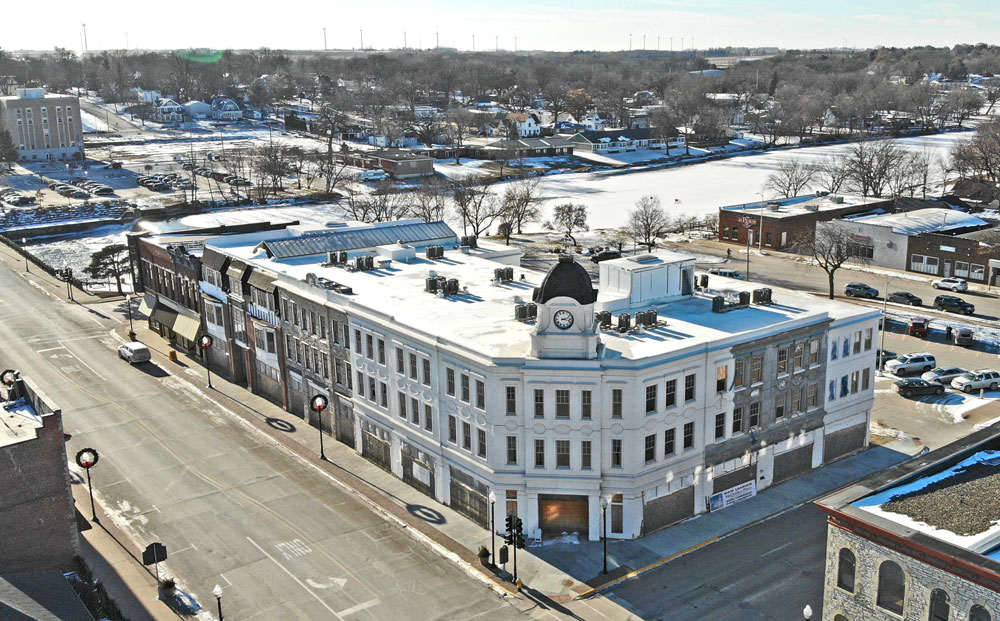
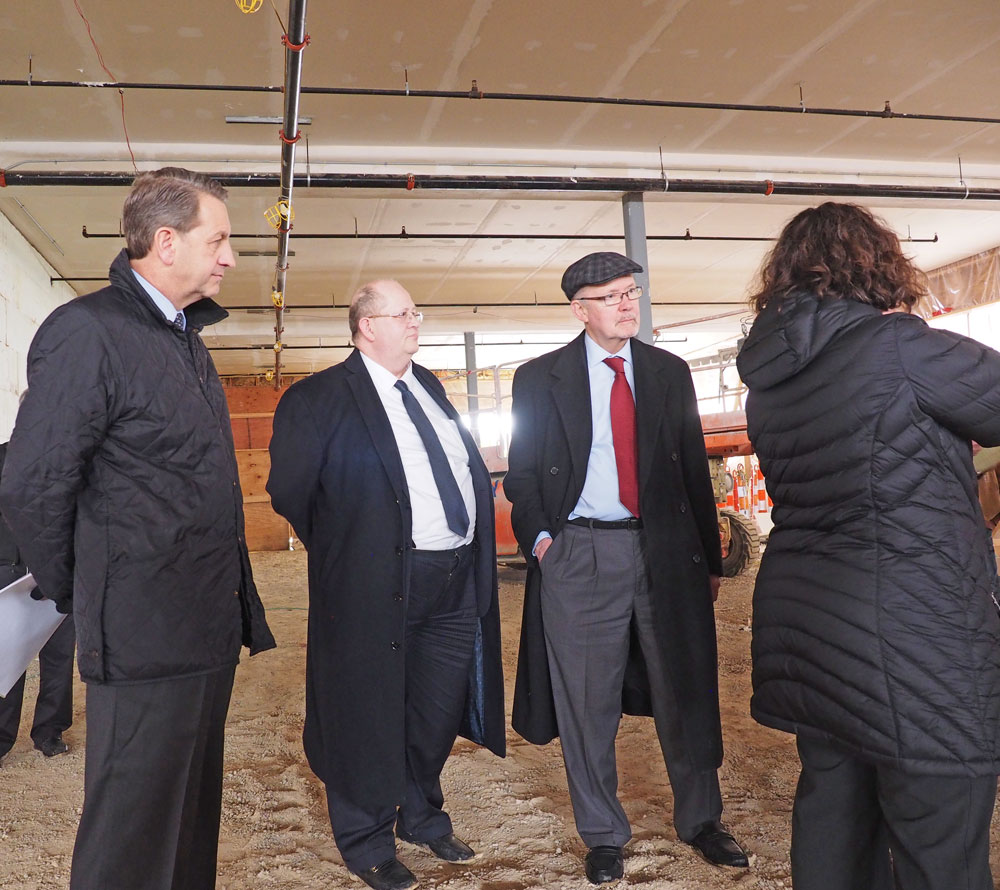
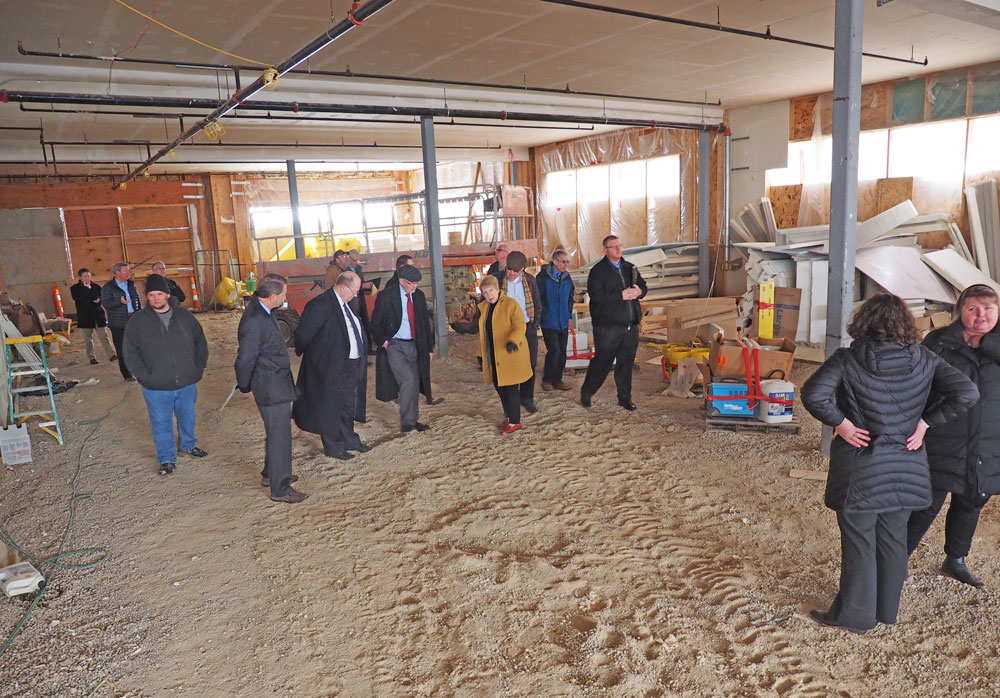




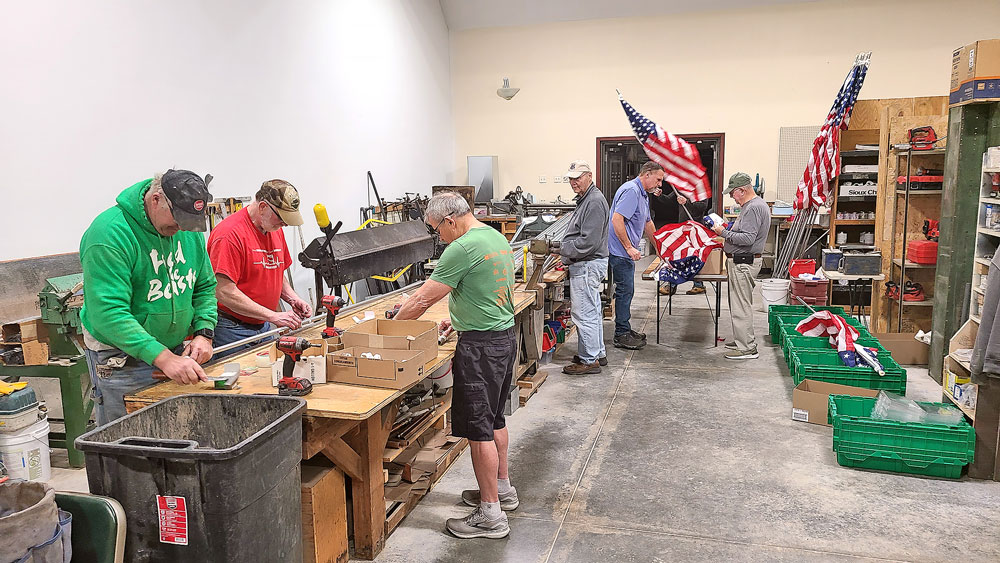


Social Share